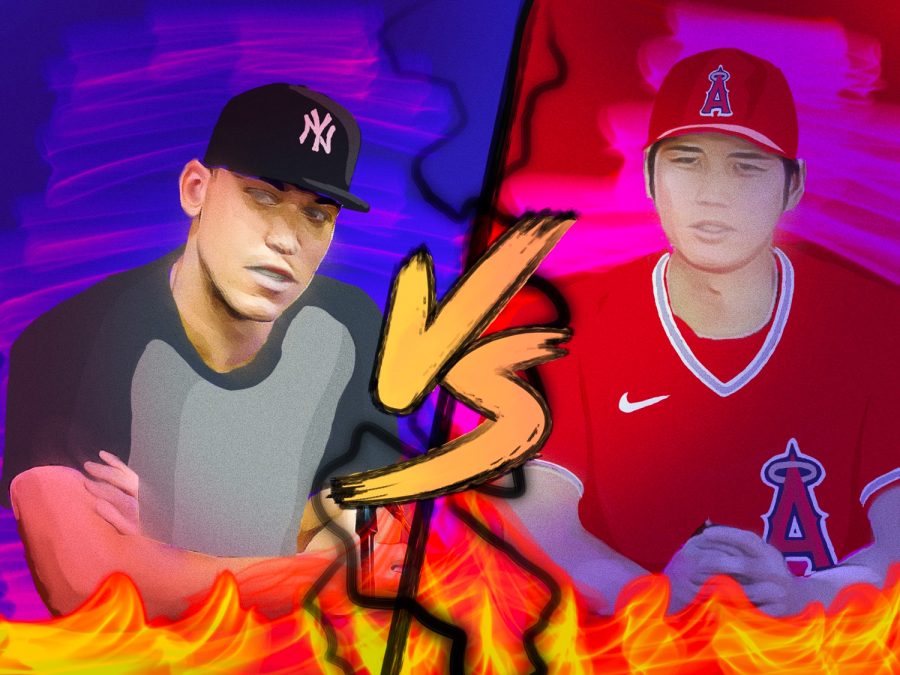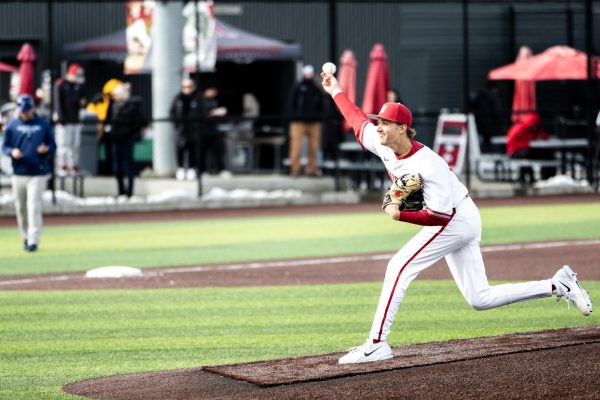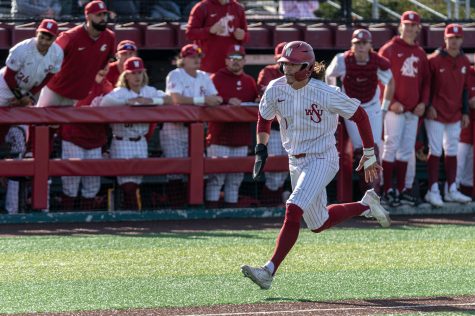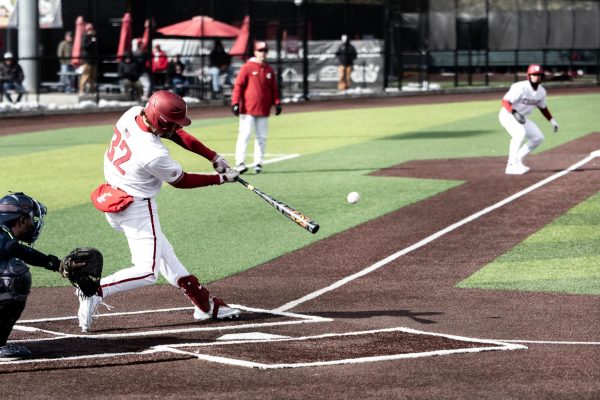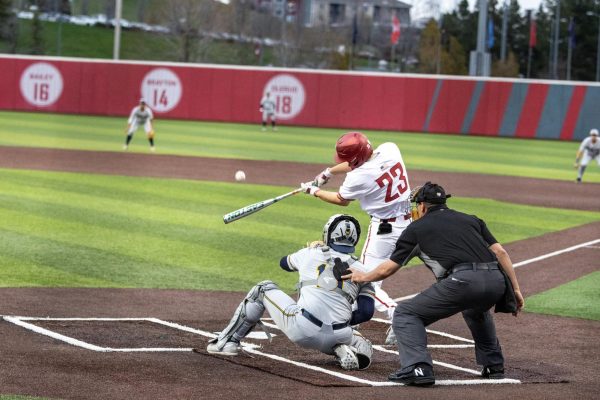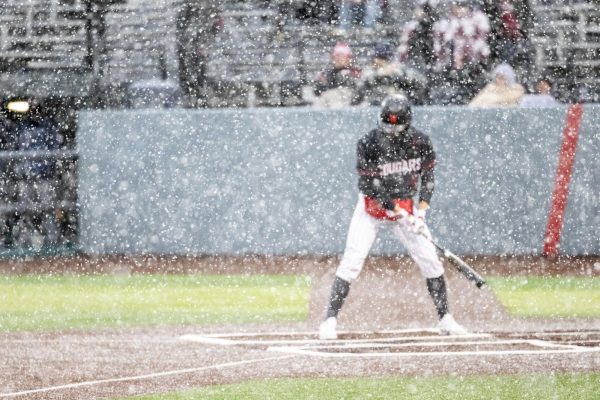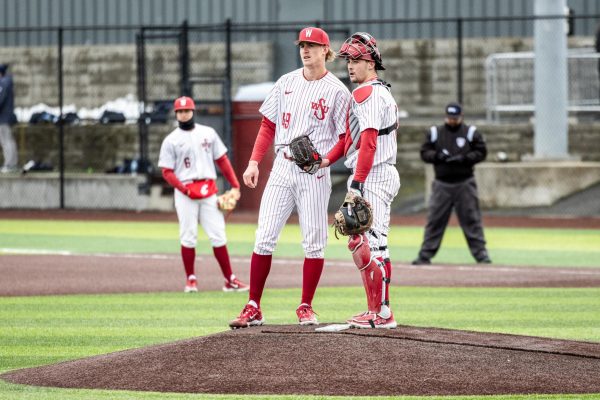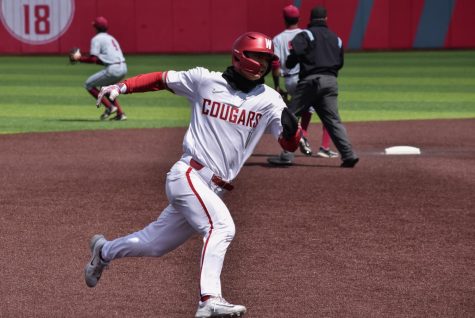Judge vs. Ohtani: The 2022 AL MVP race is a battle of ideologies
Is it actually the most “valuable” player?
Aaron Judge (left) and Shohei Ohtani (right) would be unanimous MVPs in most any other year. Unfortunately, they played in the same season.
October 27, 2022
The 2022 American League Most Valuable Player is a two-person race, and both players had historically significant seasons.
Yankees outfielder Aaron Judge broke the AL home run record and was close to winning a triple crown, but by definition, he would not be the most “valuable” player. One might think that would automatically disqualify him from winning the award, but historically that award is not voted based on the traditional definition.
Judge will likely win the award, but the most valuable player was, is and will be Shohei Ohtani for the next decade. Ohtani is the reigning AL MVP and is having a season that rivals his previous one. He is the most “valuable” player, as he led his team in a majority of offensive and pitching categories.
So who should win the award? For the first time in several years, there are two fantastic candidates with their own strengths and weaknesses that it would almost make sense to make them co-MVPs.
Polling members of the WSU community and the greater Pacific Northwest area wielded split opinions. In a poll of 53 students on campus, 21 said they believed Ohtani was the MVP, and 32 thought Judge was.
Over multiple social media platforms of baseball fans of the PNW, 200 individuals were asked who they thought the MVP was; 122 said they believed it should go to Judge and the remaining 78 said Ohtani.
Judge:
The candidacy for Judge is based on several factors, including; record-breaking offensive statistics, team success and narrative.
For starters, he broke the record in the AL for home runs in a single season with 62. In any other year, not only would that guarantee him the award, but it would more than likely give him the award unanimously.
Furthermore, he nearly won the triple crown, finishing first in all of the MLB in home runs, tied for first in all the MLB and first in the AL in runs batted in and finally finishing second in the AL and fifth in all of baseball in batting average.
He is a well-rounded hitter and player overall, as he was an above-average defender tallying two outs above average, according to Baseball Savant.
Judge finished the season with a batting average of .311, 62 home runs and 131 runs batted in for an OPS of 1.111 and OPS+ of 211, making him 111% better than the average hitter. On top of that, he also stole 16 bases, not something he has always been known for.
He tallied 10.6 wins above replacement. A 2.0 WAR means a player is a solid everyday player, 4.0 is an all-star level, 6.0 is an MVP candidate, 8.0 is an amazing season that will be remembered for years and over 10.0 is nearly unheard of.
Judge’s last main argument is that his team made the playoffs and saw success during the regular season, while his counterpart Ohtani was essentially eliminated from playoff contention at the all-star break.
As well as this, with Ohtani winning the previous MVP, voters may feel fatigued with giving the same player the award for two consecutive seasons, no matter how much he deserves it, similar to how LeBron is treated in the NBA and even Ohtani’s teammate in Mike Trout.
Ohtani:
Ohtani is the most “valuable” player, the only argument against that is that he could not single-handedly carry his team to the playoffs, even if baseball is a team game.
He was top-three on the team in batting average, home runs, RBIs, stolen bases, OPS, OPS+, innings pitched, ERA, strikeouts, wins, ERA+ and many other statistics.
While his team was terrible and the talent around him was lackluster, he was still putting up numbers and doing his part, as his season was good for a 9.6 WAR.
Hitting-wise, he finished with a .273 average, 34 home runs, 95 RBIs, 11 stolen bases and an OPS+ of 145. While not enough to topple Judge alone, Ohtani also has his pitching.
He went 15-9 with a 2.33 ERA and 219 strikeouts, good for an ERA+ of 172, making him one of the best hitters as well as one of the best pitchers in the league.
While his team was not good, it was no fault of Ohtani’s, but that may be the difference between a second-straight MVP and a measly second-place finish.
Looking at the cases of both players, Ohtani is the MVP, however, he will not WIN the MVP. Judge will win the MVP and it will be another example of the award not going to the most “valuable” player but rather the best player with a particular set of circumstances and arbitrary criteria.


